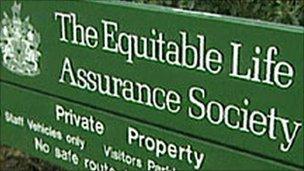Spending Review: Equitable Life pay-out of £1.5bn
- Published

Payments should start in the middle of next year
Some 1.5 million policyholders with Equitable Life will receive a share of a total of £1.5bn in compensation, the chancellor has confirmed.
As expected, George Osborne said that the compensation payments would start in 2011.
Those who were hardest hit because they had already started taking their pensions through "with-profits" annuities will benefit the most.
Equitable Life came close to collapse nearly 10 years ago.
Campaigners said the payment was "woefully inadequate" and raised the possibility of a legal challenge.
'Balance'
Equitable Life, one of the UK's leading private pension companies, closed to new business in 2000.
Mr Osborne said that when setting the compensation level, he accepted the views of the Parliamentary Ombudsman.
In July 2008, the ombudsman - Ann Abraham - said ministers should set up a compensation scheme, and suggested a figure of between £4bn and £4.8bn.
She decided that the near-collapse of the company and the losses suffered by its customers were largely the government's fault, because various departments and agencies had failed to regulate the Equitable properly.
Campaigners said that compensation should be at about £5bn, but a later review by Sir John Chadwick - ordered by the last Labour government - said that the pay-out should only total about £340m.
He said that the investors' absolute loss was between £2.9bn and £3.7bn but their compensation should be capped for each policyholder at a fifth of that.
The chancellor rejected this view, but said the pay-out should be affordable.
"I agree with the Ombudsman that the relative loss suffered is the difference between what policyholders actually received from their policies, and what they would have received elsewhere," Mr Osborne told the Commons.
"The Parliamentary Ombudsman herself recognised that a balance had to be struck between being fair to policyholders and fair to taxpayers."
The payments will be staggered over the coming years from 2011, with the first £1bn paid over the next three years.
Key savers
The Treasury said that a group of 37,000 people would receive annual payments over their lifetime because they had faced the biggest upheaval.
Those people - many of whom are aged over 75 - held with-profits annuities and so were already taking a pension. They were particularly vulnerable to reductions in the value of their policies because they were trapped by being unable to move their funds elsewhere.
On average they lost £16,500 each, the Treasury said. The regular payments, totalling £620m and which will come from the £1.5bn pot, will effectively replace the money they have lost.
"We shall be paying in full the category of policyholders who suffered most from their losses," said the financial secretary to the Treasury, Mark Hoban.
"For other policyholders, we shall be providing a level of funding for the payment scheme that strikes a fair balance between the interests of policyholders and those of taxpayers in the current difficult financial circumstances.
"We need to continue the rapid progress that we have made in just five months so we can meet our aspiration to make the first payments by the middle of next year."
More details on how other policyholders will be paid will be announced in January.
Challenge
Paul Braithwaite, of the Equitable Members Action Group, said that the announcement by the government was "cynically" timed and a disappointment. It could prompt a legal challenge from campaigners, he added.
"We are shocked at the deplorably low level of the proposed payout. It effectively means that 400,000 serious pensions savers will have 75% cuts," he said.
He said the £620m was a "woeful underestimate" of losses suffered by those with the with-profits annuities.
He was also unhappy that those who had bought one of these annuities before September 1992 would not be compensated. These people numbered an estimated 10,000, he said.
"The burden of government has been to decide on what is fair between Equitable Life policyholders and tax payers," said a spokesman for the Equitable.
"The immediate task is to get on so that policyholders who have suffered losses see the colour of the money and obtain closure after a decade of waiting."